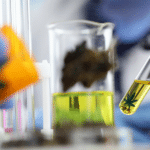A new study from researchers at San Diego State University examined the interaction between cannabinoids and alcohol on the fetus.
A new study from researchers at San Diego State University examined the interaction between cannabinoids and alcohol on the fetus. The scientists used pregnant rats to avoid the ethical implications of exposing babies to drugs. Fetal alcohol exposure impaired coordination and motor control of the rats, which lasted throughout adolescence. But CP-55,940 — a synthetic cannabinoid much more powerful than THC — did not affect motor control. It slightly reduced weight a week after birth, but this returned to normal by the rats’ adolescence. In combination with booze, however, the cannabinoid amplified alcohol’s toxicity. Research on cannabis and pregnancy has consistently demonstrated this interaction: Cannabis and THC are not intrinsically harmful to the fetus. But in the presence of fetal growth factors, combined with inflammation from alcohol or nicotine, cannabinoids become cytotoxic. This appears similar to the way cannabinoids are non-toxic in most settings but can encourage cell death in cancer cells (which are inflamed and proliferative, just like fetal cells exposed to alcohol). How do these sorts of results extend to research in humans? It will lead to false positives in research on the teratogenicity of cannabis. If women who consume cannabis and also drink or smoke cigarettes are not excluded from studies, then the synergy between cannabis and alcohol will be misinterpreted as a toxic effect of cannabis. Nearly all human research on cannabis in pregnancy is fatally flawed by ignoring this factor.
Read study: Altered motor development following late gestational alcohol and cannabinoid exposure in rats
Adrian Devitt-Lee is a research scientist and longtime Project CBD contributor. © Copyright, Project CBD. May not be reprinted without permission.







